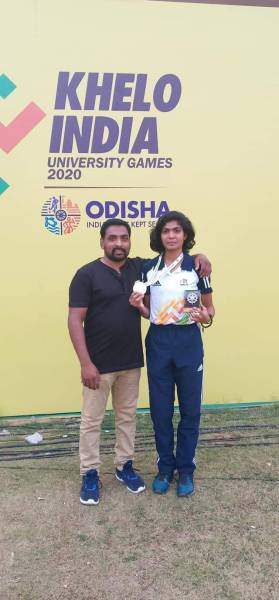Before the second-round heats, India’s last chance to qualify for the Paris Olympics from the World Relays, Jyothika Sri Dandi made a call to her biggest supporter, father Srinivasa Rao. The shaky wifi forced the conversation to be brief, but the instructions were effectively conveyed.
“I told him that the wifi connection was weak, and he replied, ‘forget the wifi connection, get connected to the race’. He asked me to give my best and that’s what I tried,” Jyothika, who ran the second leg in the 4x400m in the Bahamas, told The Indian Express.
It may have been a short, routine conversation but that was more than enough to motivate Jyothika, who ran the fastest split (51.36s) in the 3:29.35s team timing that earned them the second spot in the race and a ticket to Paris.
The 23-year-old from Tanuku town in West Godavari district of Andhra Pradesh, took to running when she was 13. For initial training and diet, she didn’t have to look too far as her father, a bodybuilder himself, took charge.
“Jyothika used to participate in local rotary club competitions and win all the races. I recognised her talent and realised that she had a future in athletics,” Rao recalls.
A turning point in Jyothika’s career came in 2021 when her coach Vinay Prasad suggested she seek seasoned coach N Ramesh’s help. Ramesh, who is now the chief national coach for juniors, has a knack for spotting talent. When he first saw Jyothika run at the Gachibowli stadium in Hyderabad, he knew the youngster had potential.
“She had the physique of a quarter-miler (long limbs) and her stride lengths were good as well. But the thing that impressed me the most was her endurance. Usually, 400m runners get a little tired after the 350m mark but that’s not the case with her,” recalls Ramesh, who has been in the national set-up for over 15 years.
When Jyothika first arrived to train under Ramesh, she was clocking around 55 seconds. Although blessed with great stamina, she lacked strength and speed. “We did a lot of sessions in the gym to strengthen her muscles. Lots of resistance running and drills that focused on strengthening especially her core muscles,” explained Ramesh.

Her first big break came two years later at the 2023 400m nationals, where she bagged the gold clocking 53.05s. The effort also earned her a place in the national camp at Thiruvananthapuram. Ramesh refuses to take credit for Jyothika’s rise and feels it’s her father’s passion that has brought her this far.
“I have never seen any parent so passionate about their children’s sport. I remember when Jyothika was offered a job in theRailways, he didn’t want her to take it as he thought it might affect her sport. Usually, parents just care about jobs. But this was a refreshing change. I had to convince him,” says Ramesh.
It wasn’t just people on the athletics circuit who had a great interest in Sunday’s race but also a well-known figure from badminton. Chief national coach Pullela Gopichand, whose Mytrah foundation supports Jyothika and other athletes from the state, keenly followed the proceedings. He was ecstatic with Jyothika’s blistering run.
“She has been fantastic and I’m very happy to see her performance at the highest level. It is wonderful to see such talent come – whether it’s Jyothi Yarraji, Jyothika or Nandini Agasara. It feels good to play a small part in their success,” Gopichand tells The Indian Express.
Ups and downs
It has not been a straight career graph for Jyothika. Last year, after medalling at the Asian Championship, she suffered a knee injury that cost her a spot at the Hangzhou Asian Games. “I think my father was more depressed than me. But then, giving up was not an option,” says Jyothika in a determined tone.
When Jyothika watched her teammates win a silver medal at the Asian Games a month later, she had mixed feelings. “I was happy that they won but sad that I was not part of the team. When they climbed the podium to receive their medals, I imagined myself there,” she says.
But her teammates’ triumph also motivated her. Jyothika was back on the track just a month after the injury, but it took her almost a full season to regain peak fitness.
“When I was back on the ground trying to push myself, I had the fear of getting injured again. It was a difficult phase but I have worked a lot with my physios. We found that the muscles around the knee weren’t strong, and were putting more pressure on the knee. Now things are better,” she says.
Finally, when she did get a good wifi connection after her race in the Bahamas, the conversation with her father was as brief as it could be. “He was emotionally overwhelmed and told me he didn’t have words to express how he felt,” she said.


